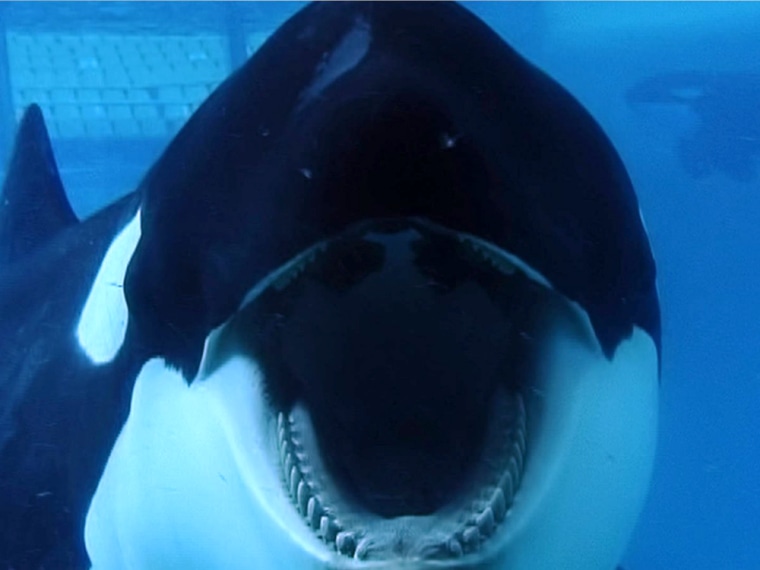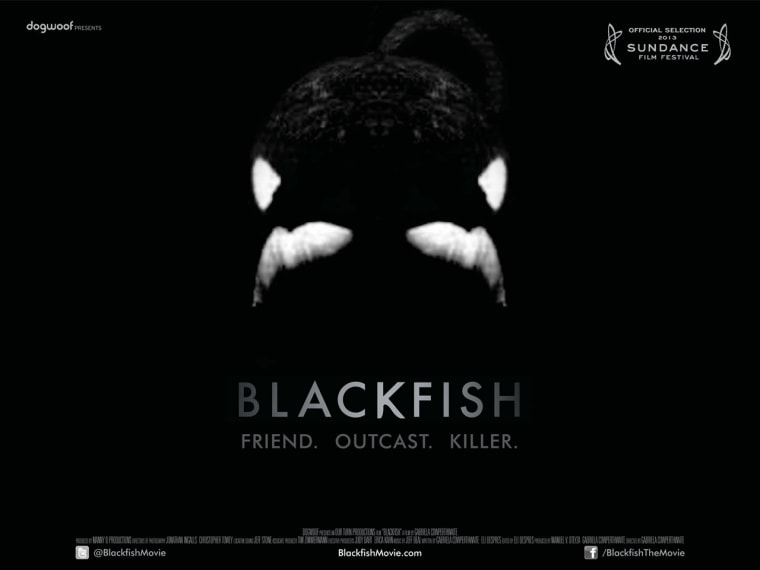
It's unlikely viewers walking out of summer blockbusters such as "Man of Steel" or "Despicable Me 2" are going to change their behavior based on the film they've just seen -- unless they're currently employed as a Kryptonite distributor or Minion-mutator. But there's a genre of social-issue documentaries, including the newly released "Blackfish," that send viewers home with new information that just might result in changed attitudes and behavior.
"Blackfish" focuses in on SeaWorld orca Tilikum, who caused the 2010 death of trainer Dawn Brancheau, and goes on to further explore the keeping and training of orcas by the marine park.
But director Gabriela Cowperthwaite says she didn't intend for her documentary to force viewers to change their opinion.
"I don't have one end goal for this film," she told NBC News.com. "I would be happy with a multitude of reactions. ... I didn't want the film to ever feel like it was telling you what to do or how to feel. ... You were simply provided the truthful facts, and if you were moved by it, that feeling is yours"
Cowperthwaite said she purposely did not include a toll-free number or other call to action at the end of the film.

"Sometimes the most effective thing you can do as a filmmaker is to tell a story in a truthful and impactful way," she said. "(Viewers) don't feel like it's medicine, they don't feel like they should be doing something or should feel guilty."
Since the film's release, however, the people behind "Blackfish" are spreading their message by aligning with groups such as Voice of the Orcas, a website run by former SeaWorld trainers. And Cowperthwaite says she'd like to see marine parks turn into sea sanctuaries, where the captive whales are retired to a natural ocean environment. "People would go in droves to see a killer whale being a killer whale," she said.
Cowperthwaite requested an interview with SeaWorld representatives for the film, but they declined. SeaWorld has since issued a press release disputing eight points raised by the movie, to which the filmmakers later responded.
Film critic Matt Zoller Seitz calls this subgenre of documentary "the 21st century animal rights version of abolitionist pamphlets." "Blackfish" is only the most recent of its kind, and while there's no overarching proof such films can alter individual viewer behavior, past films have concretely affected the world outside the theater.
Less than two months after Morgan Spurlock's infamous 2004 fast food expose "Super Size Me" premiered at the Sundance Film Festival, McDonald's announced it was phasing out Supersize fries and drinks, although a spokesman at the time said the decision had "nothing to do with that [film] whatsoever."
The 2010 Oscar nominated anti-fracking documentary "Gasland," directed by Josh Fox, was subject to multiple attacks from the natural gas industry but also spurred a grassroots movement credited with aiding hydrofracking bans in Pennsylvania and New York.
Sparking a debate and forcing big business to take notice of a relatively small movie qualifies as a win for documentary filmmakers.
Patricia Aufderheide, co-director of the Center for Social Media and a professor at the School of Communication at American University in Washington, D.C., has studied the social impact of documentaries and their messages.
"(Documentaries cause) change along the lines of networks of influence," Aufderheide told NBC News.com. "It's not just, 'I saw the movie.' It's, 'I saw the movie, and other people who I know think this movie is important. Now they're talking about it, and I'm somebody who's in some kind of position to be able to do something with this.'"
She says it's important for filmmakers to set measurable goals for outreach campaigns and also to consider not just who's seeing a film, but what they can actually do once they've seen it.
One recent example is "The Invisible War," director Kirby Dick's 2012 film about rape in the military, which was nominated for a best documentary Oscar. Although the film grossed under $100,000 in U.S. theaters, it was screened for powerful and influential viewers including Secretary of Defense Leon Panetta, who reportedly credited the film with contributing to a decision to revise a controversial policy on the handling of sexual assault cases in the military.
Of course, the larger a film's audience is, the larger the discussion surrounding it will become. Davis Guggenheim's 2006 Oscar-winner, "An Inconvenient Truth," which exposed former vice-president Al Gore's lecture on climate change to a broad audience, earned over $24 million in the U.S. and is often cited in the continuing debate over the issue.
Even if viewers don't retain every fact or figure presented by a filmmaker, they're likely to carry away something even more important, Aufderheide said.
"They're going to remember an emotional journey that they went on," she said. "That will help them understand, experientially, a problem that they had only seen as a headline before."